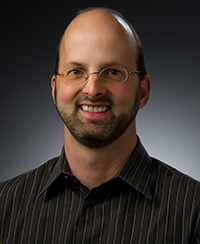 Samuel Newlands
Samuel Newlands
An interdisciplinary research collaborative between the University of Notre Dame and Cornell University has awarded nearly $2 million to 18 projects in five countries. The researchers will examine the theoretical, empirical, and practical dimensions of hope and optimism.
The project, Hope and Optimism: Conceptual and Empirical Investigations, is funded through a generous grant from the John Templeton Foundation and additional money from Notre Dame and Cornell.
The initiative is bringing together philosophers, social scientists, and theologians for residential and non-residential fellowship programs, conferences, writing projects by the co-directors, and creative stage and screen competitions.
“Hope is a concept that we talk about every day, but we don’t understand it all that well,” said Samuel Newlands, the William J. and Dorothy K. O’Neill Collegiate Associate Professor of Philosophy in Notre Dame’s College of Arts and Letters, co-director of the Center for Philosophy of Religion and co-director of the Hope and Optimism project. “There is an incredible range of topics being explored, and that shows us just how ubiquitous hope is in our lives.”
Among the projects recently funded:
- “What Should I Hope From You?” by Adrienne Martin, a Claremont McKenna College professor of philosophy, politics, and economics, will examine how hope is invested in people, as opposed to objects. She will argue that through interpersonal hope and emotions, such as disappointment, gratitude, and appreciation, people encourage each other to meet challenging standards.
- “Are There Any Advantages to Racializing Hope?” by Andre Willis, an assistant professor of religious studies at Brown University, will look at how practical hopes linked to citizenship—inclusion, recognition, membership, and success—have framed the African American religious experience. Willis will explore religious narratives of hope that African Americans have built through a history in the United States that has often been marked by dehumanizing political conditions.
- “How Does Optimism Help Incarcerated Individuals Return to Their Communities, Overcome Barriers, and Become Positive Productive Members of Society?” by George Mason University psychologists Jeff Stuewig and June Tangney will explore the role optimism plays in the lives of incarcerated individuals and those reintegrating after being released. They will determine how optimism becomes a form of resilience among those in the criminal justice system and how that optimism changes over time based on types of experiences in that system.
In addition to an original grant of $3.8 million, the John Templeton Foundation is adding another $350,000 to expand public engagement, including the production of a documentary chronicling the process and findings of the Hope and Optimism project.
“It’s great to be able to bring some of the results of this rarified academic research and put it into the public on screen and stage,” said Andrew Chignell, associate professor of philosophy at Cornell’s Susan Linn Sage School of Philosophy and co-director of the Hope and Optimism Project. “We think we’ve found a fantastic group of interdisciplinary scholars and topics to explore.”
The collaborative venture will total more than $4.7 million.
Additional projects receiving funding:
- “Why Is It Better For You (And For Us) To Hope Than to be Realistic?,” Claudia Bloser and Titus Stahl, Johann Wolfgang Goethe University
- “Is Optimism Good For Us?,” Lisa Bortolotti and Anneli Jefferson, University of Birmingham
- “Can We Maintain Hope in the Face of Inevitable Death?,” Anthony Wrigley, Keele University
- “Can Hope Be Taught?,” Sarah Stitzlein, University of Cincinnati
- “Can I Believe In What I Hope?,” Robert Pasnau, University of Colorado Boulder
- “Hope and Optimism in Religious Epistemology,” Matthew Benton, University of Oxford
- “Does Hope Justify Faith?,” Anne Jeffrey, Georgetown University
- “What Are the Social Implications of Hope and Optimism?,” Margaret Clark, Yale University, and Elizabeth Clark-Polner, University of Chicago
- “Are Children Optimists or Realists? A Developmental Investigation of Optimism,” Lori Markson, Washington University
- “What Role Does Hope and the Related Constructs of Optimism and Expectations Play in the Physical, Emotional, and Mental Health of Couples in Transition to Parenthood?,” Eshkol Rafaeli, Bar-Ilan University
- “Is There Epigenetic or Genetic Variation That Associates with Optimisms?,” Jari Lahti, University of Helsinki
- “Are Optimistic People Healthier or Are Pessimistic People Sicker?,” Michael Scheier, Carnegie Mellon University
- “How Do Optimism and Hope Vary Over Time and Across Countries,” Tom Smith, National Opinion Research Center at the University of Chicago
- “Looking on the Bright Side: The Life and Times of Optimism in America,” Philippa Clarke, University of Michigan
- “How Do Peers Shape the Development and Persistence of Hope and Optimism in Adolescents?,” Jason Fletcher, University of Wisconsin-Madison
Additional phases of the Hope and Optimism Project will include a playwriting contest and a filmmaking contest. Hope on Stage will award $10,000 to the writer of an original play that explores the nature, role, sources, or risks and benefits of hope and/or optimism in human life. Additional award funding will support the production of the play in professional theaters in Ithaca, N.Y., and Los Angeles in spring 2017. Hope on Screen will give $10,000 in prizes to amateur filmmakers who explore hope and optimism in a short video, including $2,500 for first prize.
For more information about the project, visit hopeoptimism.com.


